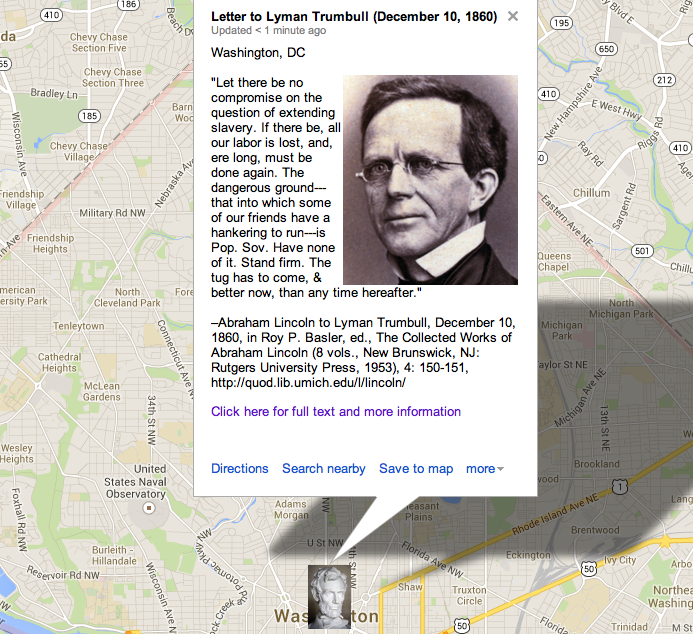Contributing Editors for this page include Annemarie Gray and Susan Williams Phelps
Ranking
#45 on the list of 150 Most Teachable Lincoln Documents
Annotated Transcript
“Stand firm. The tug has to come, & better now, than any time hereafter.”
Audio Version
On This Date
HD Daily Report, December 10, 1860
The Lincoln Log, December 10, 1860
Close Readings
Posted at YouTube by “Understanding Lincoln” participant Annemarie Gray, November 15, 2013
Susan Williams Phelps, “Understanding Lincoln” blog post (via Quora), September 9, 2013
Custom Map
How Historians Interpret
“Discarding his longtime Whiggish belief in congressional supremacy, Lincoln forcefully interjected himself into the congressional debate. No previous president-elect ever made such a show of power and influence before his swearing in. He delivered no public speeches and issued no state papers on the compromise issue – to do so, he still believed, would only exacerbate matters by angering both anti-slavery men and border state conservatives. Instead, he made his views clear in a series of remarkably tough letters to key allies on Capitol Hill, which he knew would be widely shared with other Republicans. Hoping still to embolden Southern Unionists, or at best steel the rest of the country for the possible use of force to protect federal property and collect revenues, he now made it clear he would reject fundamental concessions that might guarantee both, but at the expense of slavery expansion. Lincoln’s reply to Trumbull left little doubt where he stood. ‘Let there be no compromise on the question of extending slavery,’ came the pointed instructions. ‘If there be, all our labor is lost, and ere long, must be done again. The dangerous ground – that into which some of our friends have a hankering to run – is Pop[ular]. Sov[reignty]. Have none of it. Stand firm. The tug has to come, & better now, than any time hereafter.”
— Harold Holzer, Lincoln President-Elect: Abraham Lincoln and the Great Secession Winter 1860-1861 (New York: Simon & Schuster, 2008), 158.)
“The symbolic significance of the issue of slavery in the territories, as well as its practical implications, dominated his thinking in the winter of 1860-61… On December 10, he wrote Trumbull in the same vein: ‘Let there be no compromise on the question of extending slavery. If there be, all our labor is lost, and, ere long, must be done again. The dangerous ground – that into which some of our friends have a hankering to run – is Pop. Sov. Have none of it. Stand firm. The tug has to come, & better now, than any time hereafter.’ A week later, he reiterated to Trumbull his firm stance: ‘If any of our friends do prove false, and fix up a compromise on the territorial question, I am for fighting again.’” 1938-1940
–Michael Burlingame, Abraham Lincoln: A Life (2 volumes, originally published by Johns Hopkins University Press, 2008) Unedited Manuscript by Chapter, Lincoln Studies Center, Volume 1, Chapter 17 (PDF), 1938-1940.
NOTE TO READERS
This page is under construction and will be developed further by students in the new “Understanding Lincoln” online course sponsored by the House Divided Project at Dickinson College and the Gilder Lehrman Institute of American History. To find out more about the course and to see some of our videotaped class sessions, including virtual field trips to Ford’s Theatre and Gettysburg, please visit our Livestream page at http://new.livestream.com/gilderlehrman/lincoln

